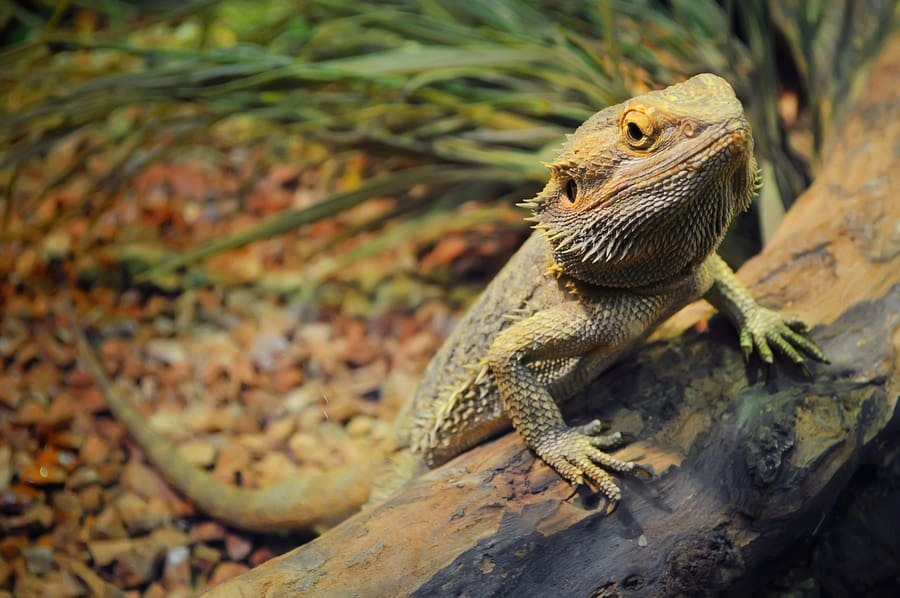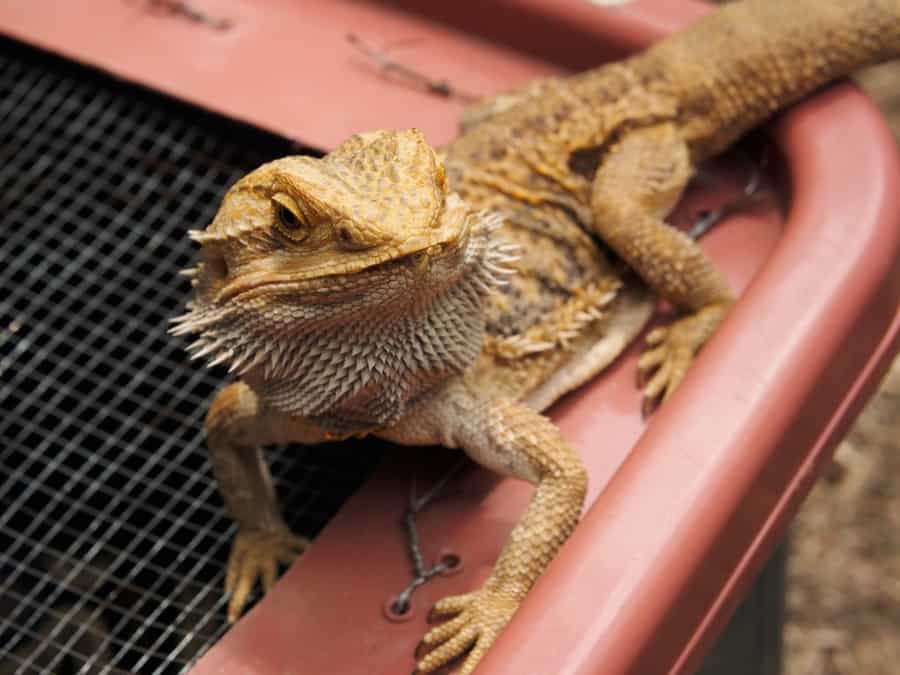
Bearded dragons are a very popular, easy-to-care-for lizard that many people just love. But for non-owners, many people want to know if they smell bad. The concern over whether bearded dragons stink is one we need to dig into.
Bearded dragons do not produce an odor from their skin but their poop can definitely stink. However, their enclosure will produce the most odor from rotting greens, decaying insects, or uncleaned poop.
Bearded Dragons are actually one of the few animals that do not give off an odor. This is not to say their poop does not stink or that their cage does not stink, because that can be an entirely different story. Usually, when you hear someone say that their bearded dragon stinks it is something other than the bearded dragon that actually smells.
Common Causes of Bearded Dragon Stink
The most common cause of bearded dragon stink is the enclosure that they are kept in. If they are fed crickets, you will notice an awful smell especially if they die inside the cage. This smell is produced as they decay which occurs quickly after crickets die. This is why crickets are a poor choice of food for the bearded dragon. This is also true of some species of worms such as the super worm.
Another cause of the “bearded dragon stink” is when greens inside the cage begin to rot and cause bacteria and parasites. Still, another cause can be excess moisture which can lead to mold and parasites which can actually infect your bearded dragon.
Summary: A bearded dragon’s enclosure is what will stink from food or poop, not the lizard itself. If you keep the cage clean, it will not smell.
Is Bearded Dragon Poop smelly?
Depending diet, some bearded dragon poop is so stinky that you can smell it across a room. The most important tactic is to remove it as quickly as possible from the cage so that it does not get worse. If you are not going to be around, there are charcoal odor bags that can be placed next to the enclosure to help with the odor. Once you return you should remove the feces.
The easiest way to deal with removing the poop is to use newspaper or paper towels as your substrate. It helps you in two ways. For one, it makes it easy to see where your bearded dragon has pooped and secondly, it makes it easier to change. Just tear out the paper towel or cut out the newspaper and you can put down a new one easily.
If it has gone all the way through to the aquarium bottom just wipe it down with a solution of one part vinegar and one part water, and be sure to wipe down with a paper towel soaked with plain water. Then dry thoroughly. Putting down a new piece is just as easy.
How to Make Bearded Dragon Smell Better
The key to keeping your bearded dragon smelling fresh and clean is keeping his enclosure as clean as possible. He should be bathed at least once a week with some veterinarians recommending two baths per week, but one should suffice. He should be fed fresh greens and insects every day.
Dead insects and wilting greens should be removed at once to avoid unnecessary odor. In between baths be sure to wipe any poop off the bottom of his tail as soon as you see it. Check for it after picking up feces every time as the bearded dragon drags his tail through everything.
Wiping his tail off with plain water and dry it thoroughly. Be sure to get him under the heater so he is not cold. Taking care of poop under his tail will also help to prevent infections.
Summary: A clean enclosure will go a long way to keep your bearded dragon from smelling. Additionally, wipe any dried poop from his/her tail.
How to Bathe a Bearded Dragon
When bathing a bearded dragon the most important step is preparation. Make sure you have carved out a 20-30 minute time block where you can just sit and watch your bearded dragon play around in the water. It will be a fun time for all.
If it is a small or young one you should be able to safely bathe him or her in the kitchen sink. If it is an older or larger one, then the bathtub is the ideal place to give the bath.
Begin by adjusting the water to 85-92 degrees Fahrenheit. Be sure to use a thermometer so that you do not scald your bearded dragon. Fill the sink one inch for a baby or small one or two to three inches for an adult or large bearded dragon.
The water should be no deeper than your bearded dragon’s knuckle. Gently place him into the water and watch him have fun. Your bearded dragon will lay there and relax, splash around, and just have fun. That is all there is to it.
Do not add soap of any kind as the bearded dragon will be drinking the water and it is not needed. During this time, the water will help to clean his skin and will help with shedding.
Beardie Diet & Smelliness
When Bearded Dragons are young they should be fed 70% insects and 30% greens. At the adult stage it should be 30% insects and 70% greens. Veggies that are good for your Bearded Dragon include collard greens, dandelion greens, mustard greens, turnip greens, butternut squash, and yellow squash.
Do not feed them spinach, tomatoes, iceberg lettuce, avocados, or rhubarb under any circumstances as it could be deadly to your bearded dragon. Your bearded dragon’s diet should include Dubai roaches. This roach is great for both babies and full-grown adults because it has 36% protein and only 7% fat. Don’t worry these roaches cannot climb so it is nearly impossible for them to get out of their enclosure. They also do not have the same odor that crickets have.
They are a quiet insect and since they are easy to breed you don’t have to worry about having to buy them all the time. The Goliath Worm is another popular diet staple for bearded dragons because it has 9% protein. It grows up to five inches in length in a very short time.
The Wax Worm is a special treat for the bearded dragon because it has a high fat content of 21%. An adult bearded dragon will end up obese if they eat more then five of these a day.
Crickets are a food that many feed to their bearded dragon but it leaves many problems. Bearded dragons like to eat insects that are alive and crickets are hard to keep alive. Once they die in the enclosure they leave a terrible stench, so it is best to stick with insects that can be kept alive and that do not smell as much.
The Phoenix Worms are a great worm to feed your bearded dragon in terms of nutritional content. These worms are on the smaller side and they are even easy to keep alive. The trouble is that because they are small, you need several to feed your bearded dragon.
So this worm may work as a treat but feeding this worm to your beardie on a regular basis may prove to be very expensive. In addition to greens and insects, give them multivitamins once a week and calcium with vitamin D twice a week.

Safest Way to Clean Cage/Enclosure
Your bearded dragon’s cage should have a light cleaning every day and every time he poops. Whenever the bearded dragon poops, it should be picked up immediately so that the smell does not travel through the room and so that the bearded dragon does not get the feces all over him or her. Simply pick up the poop and dispose of it. If you are using paper towels and newspaper as your substrate, it is easy to clean up when they poop, simply remove the poop and put down a new piece of paper towel or newspaper.
When it is time to do a deep cleaning follow these steps:
- Place the bearded dragon somewhere where he will be safe for a few hours.
- Get your supplies out – new substrate, vinegar, bleach, water, 2 large pails or tub, old toothbrush, an old pot, gloves
- Remove everything from the enclosure, disposing of the dirty substrate.
- Place the toys and other items that are washable – plastics into the pail; anything that is wood goes into the pot.
- Fill the pot with water and boil the item for 30 minutes to kill all parasites on it. Allow drying in the sun.
- Fill the pail with one part bleach and nine parts water. Scrub all items left in a pail with the toothbrush. Be sure to get into all nooks and crevices.
- After scrubbing, allow items to sit in the bleach solution for one hour.
- After one hour, rinse items in the bucket for 15 minutes each item and then allow to air out for three hours to get rid of any remaining bleach smell.
- Get the other pail and put one part vinegar, one part water, the other toothbrush, and the paper towels or newspaper. Soak a paper towel with the solution and wet the sides and bottom of the enclosure, scrubbing in areas where there is debris stuck on. Once it is crystal clean inside, wipe it down with dry paper towels or newspaper.
- Replace the substrate and wait for the remaining items to dry and air out. Using newspaper or paper towels will be a lot easier when it comes time for cleaning.
- Once the enclosure pieces are ready, reassemble the enclosure, with fresh clean pieces.
8 Odor-Reducing Tips for Bearded Dragon Enclosures
- Pick up stinky poop as soon as it happens
- Place a charcoal odor bag next to the cage to eliminate any unwanted odor.
- Remove any greens your bearded dragon has not eaten before they rot and cause odor.
- Dead insects sitting inside the aquarium cause a rotting smell
- Once a week, the cage should be completely cleaned out so that your bearded dragon does not get sick.
- If the aquarium is too humid it can cause bacteria and parasites to grow which leave behind a nasty odor.
- Using a substrate such as newspaper or paper towels will make cleaning up easier and will cut down on odor.
- During your weekly cleaning, soaking all the items in the tank in bleach kills parasites and bacteria leaving a fresh smell and destroys the nasty lingering odor.
What Chemicals are Harmful to Bearded Dragons?
Harsh chemicals can not be used on bearded dragons. When cleaning items from the enclosure you can only use one part bleach to nine parts water. No commercial cleaning products can be used because they are too harsh. After using the bleach water mixture, you must rinse for 15 minutes. The inside of the tank can be cleaned with a 50/50 mixture of vinegar to the water as vinegar is not as harsh to the bearded dragon.
To get rid of odor, place a charcoal bag next to the aquarium. Once the bag stops working it can be rejuvenated by placing it out in the sun for a few hours and then it is ready to suck up all the bad odors once again.
